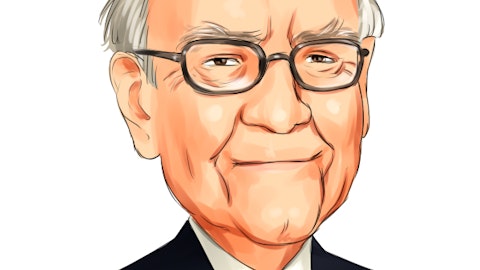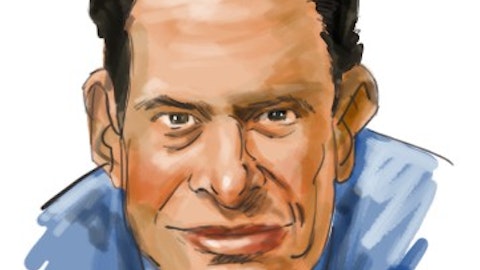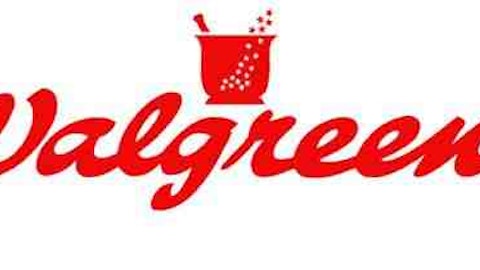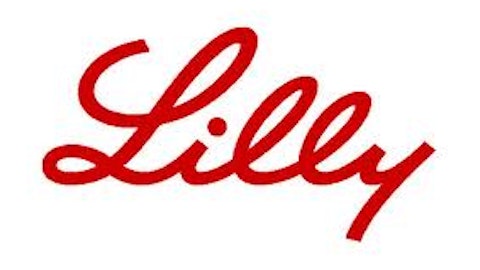Income investors can find attractive high-yields in the pharmaceutical sector right now. Many major drug makers, including familiar names like Merck & Co., Inc. (NYSE:MRK), Johnson & Johnson (NYSE:JNJ) and Bristol Myers Squibb Co. (NYSE:BMY), are yielding close to 4% or better. But with so many stocks in this segment, deciding which ones to own and the right time to buy shares requires some research.
When I assess a drug company as a potential investment, I try to identify upcoming catalysts that are likely to move the stock higher. In the case of drug stocks, the most powerful catalyst is new-drug approval by the Food and Drug Administration or its European equivalent, the European Medicines Agency.
Drug stocks typically experience huge price gains prior to an FDA approval, making this a good time to buy. A case in point is Abbott Laboratories (NYSE:ABT), whose shares soared 43% to $70 in the months leading up to approval of Humira, a popular drug used to treat rheumatoid arthritis. Acquisitions or partnerships can also be catalysts to a higher price if these add promising new drugs to the pipeline.
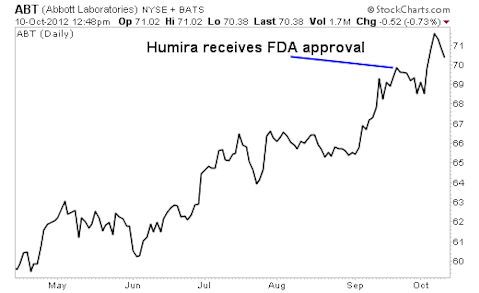
With this in mind, here are three pharmaceutical stocks with upcoming catalysts events that could lead to big share price gains in the next few months:
1. Eli Lilly & Co. (NYSE:LLY)
Yield: 4%
Eli Lilly just announced impressive late-stage clinical trial results from solanezumab, its experimental drug for Alzheimer’s disease. In a study involving 2,000 patients, the drug was shown to slow memory loss by 42% in patients with mild Alzheimer’s. Alzheimer’s affects more than 5 million Americans and the number is expected to surge to 16 million by 2050 due to an aging population. Drugs on the market now address only the symptoms, but not the underlying cause, and none have slowed progression of the disease as solanezumab has. As such, Eli Lilly will have a huge first-mover advantage in the Alzheimer’s market, which could add as much as $3 billion to the company’s annual sales.
Eli Lillyis also developing new medicines for diabetes, fibromyalgia and other mental diseases. The company is already well-known for Cymbalta, a popular antidepressant and Cialis, which treats erectile dysfunction.
The company is guiding for 2012 earnings of $3.29 per share, which is down 15% from last year, but this drop is mainly due to patent expirations and increased investments in the drug pipeline. Other strengths include a below-average debt-to-equity ratio of just 40% and operating margins at 23% which is roughly twice the industry average. Shares are up roughly 25% year-to-date and yield 3.7%.

Yield: 5%
GlaxoSmithKline and its partner Theravance Inc (NASDAQ:THRX) are seeking regulatory approval in the United States and Europe for a new once-daily treatment for chronic obstructive pulmonary disease (COPD) and asthma. An FDA decision is expected in May 2013.
COPD is one of the top five causes of disability and death in industrialized countries, and is becoming increasingly prevalent because of an aging population and higher pollution levels. The global market for asthma and COPD drugs is forecast to grow 25% to more than $47 billion within five years.
At present, Glaxo has more products in the pipeline than it has had in the past 10 years and anticipates eight FDA submissions in the next 12 months. In fact, Glaxo’s recent acquisition of Human Genome Sciences (NASDAQ:HGSI) added two experimental drugs and an approved medicine, Benlysta, to its portfolio. Benlysta is the first new drug approved for lupus in nearly half a century. The experimental drugs are albiglutide for type 2 diabetes and darapladib for heart attack and stroke prevention. Glaxo may seek FDA approval for albiglutide early next year, but darapladib is at least two years away from an FDA submission. The company expects the deal to be accretive to next year’s earnings.
In the first half of the year, sales were flat compared with the same period last year, totaling $21 billion. Earnings were 1% higher in the period at 87 cents per share. The company has a big debt load at $27.8 billion, or twice equity, but generates more than enough cash flow ($10.8 billion in the past 12 months) to service its debt. Glaxo shares yield 4.9% and are up only 2% so far in 2012.
3. AstraZeneca plc (NYSE:AZN)
Yield: 6%
AstraZeneca has multiple catalysts that include a new CEO, a major new drug that recently got FDA approval and a potential money maker in an over-the-counter (OTC) version of Nexium, used to treat gastroesophageal reflux disease.
The new CEO, Pascal Soriot, previously led pharmaceutical operations for Roche Holding Ltd. (PINK:RHHBY) and has aggressive plans to cut costs and grow Astra’s pipeline through acquisitions. In fact, AstraZeneca recently suspended a $4.5 billion share buyback, which has investors speculating if the company will soon close a major deal.
Last month, European regulators approved Astra’s new antibiotic drug Zinforo as a treatment for pneumonia and infections. This approval is great news because Zinforo is the only approved treatment for methicillin-resistant staphylococcus aureus (MRSA), a potentially life-threatening staph infection that is resistant to other antibiotics. MRSA infections can be deadly to hospital and nursing-home patients because of their weakened immune systems.
In addition, AstraZeneca just struck a deal to sell the over-the-counter rights to Nexium, to Pfizer Inc. (NYSE:PFE) for $250 million upfront, plus future milestone and royalty payments. Other deals may follow as both companies are exploring partnerships for OTC versions of other AstraZeneca prescription brands. Pfizer will begin selling OTC Nexium in 2013.
The company also has a deal with Bristol-Myers Squibb to develop a portfolio of diabetes products. The deal includes Bydureon, a weekly injectable diabetes treatment that was approved in January and is estimated to have billion-dollar sales potential.
AstraZeneca’s sales and earnings plummeted in the second quarter of 2012 due to patent expirations on key drugs such as heart-disease drug Crestor and Seroquel, used to treat schizophrenia. Sales fell 21% year-over-year to $6.7 billion, while earnings dropped 16% to $1.27 per share. The good news is that the worst of the patent cliff is over, so the company raised guidance for full-year 2012 earnings by 15 cents to between $6 and $6.30 per share as a result of the Pfizer deal in particular.
Dividends have grown about 10% each of the seven past years, which is a little less than the earnings growth rate. Astra shares are up less than 1% so far this year and yield 6%.
Risks to Consider: Buying shares before an FDA decision has risks, since not every new drug is approved. Failure of a late-stage clinical drug trial often leads to big stock price declines as well.
Action to Take –> My top pick overall is AstraZeneca. The stock has multiple upcoming catalysts that could drive growth and is attractively priced at a price-to-earnings (P/E) ratio of 7, which is less than half of the industry average of 16. Risk-adverse investors may prefer GlaxoSmithKline for its greatly improved pipeline or Eli Lilly for its strong fundamentals.
This article was originally written by Lisa Springer, and posted on StreetAuthority.


